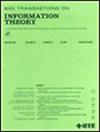热带组测试的小误差算法
IF 2.2
3区 计算机科学
Q3 COMPUTER SCIENCE, INFORMATION SYSTEMS
引用次数: 0
摘要
我们考虑的是由 COVID-19 的 PCR 检测引发的经典分组检测问题的一个版本。在所谓的热带组测试模型中,测试结果是集合在其中的个体的最低周期阈值(Ct)水平,而不是简单的二进制指标变量。我们介绍了三种经典非适应性算法(COMP、DD 和 SCOMP)的热带对应算法,并通过模拟和误差概率界限分析了它们的行为。通过比较热带算法和经典算法的结果,我们深入了解了学习测试结果(Ct 水平)所提供的额外信息。我们的研究表明,在极限状态下,热带 COMP 算法与经典算法需要同样多的测试,但对于足够密集的问题,热带 DD 算法可以用更少的测试恢复更多的信息,在某些状态下,热带 COMP 算法基本上可以被视为最优算法。本文章由计算机程序翻译,如有差异,请以英文原文为准。
Small Error Algorithms for Tropical Group Testing
We consider a version of the classical group testing problem motivated by PCR testing for COVID-19. In the so-called tropical group testing model, the outcome of a test is the lowest cycle threshold (Ct) level of the individuals pooled within it, rather than a simple binary indicator variable. We introduce the tropical counterparts of three classical non-adaptive algorithms (COMP, DD and SCOMP), and analyse their behaviour through both simulations and bounds on error probabilities. By comparing the results of the tropical and classical algorithms, we gain insight into the extra information provided by learning the outcomes (Ct levels) of the tests. We show that in a limiting regime the tropical COMP algorithm requires as many tests as its classical counterpart, but that for sufficiently dense problems tropical DD can recover more information with fewer tests, and can be viewed as essentially optimal in certain regimes.
求助全文
通过发布文献求助,成功后即可免费获取论文全文。
去求助
来源期刊

IEEE Transactions on Information Theory
工程技术-工程:电子与电气
CiteScore
5.70
自引率
20.00%
发文量
514
审稿时长
12 months
期刊介绍:
The IEEE Transactions on Information Theory is a journal that publishes theoretical and experimental papers concerned with the transmission, processing, and utilization of information. The boundaries of acceptable subject matter are intentionally not sharply delimited. Rather, it is hoped that as the focus of research activity changes, a flexible policy will permit this Transactions to follow suit. Current appropriate topics are best reflected by recent Tables of Contents; they are summarized in the titles of editorial areas that appear on the inside front cover.
 求助内容:
求助内容: 应助结果提醒方式:
应助结果提醒方式:


